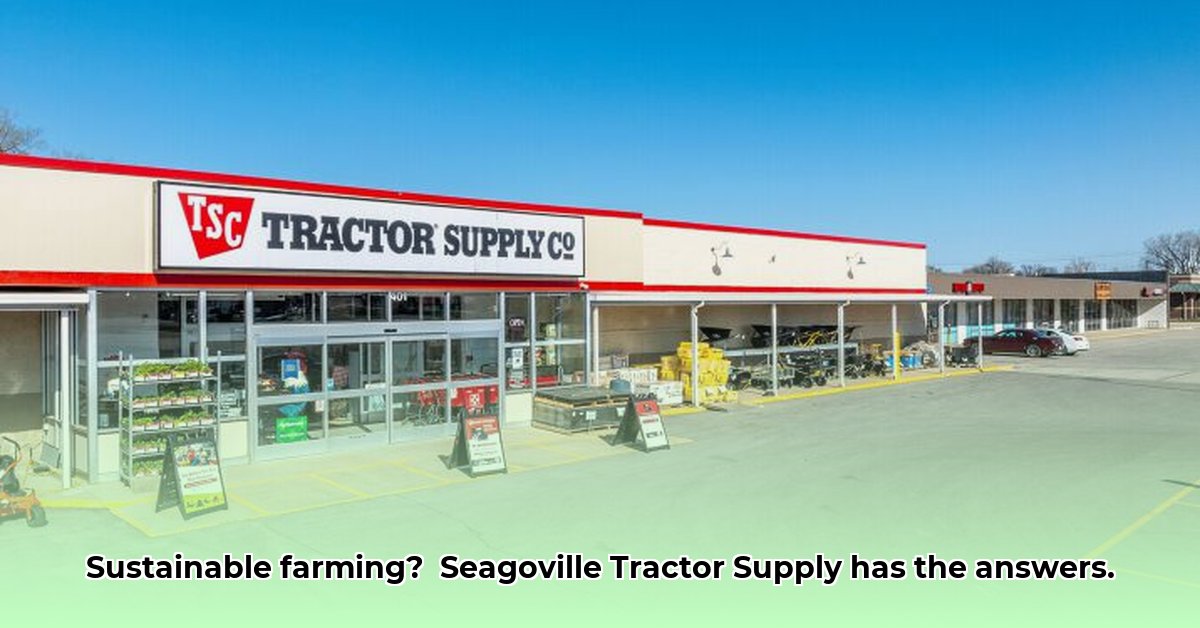
Seagoville Tractor Supply is a go-to resource for many local farmers and gardeners. But how much does this popular store contribute to sustainable agriculture? This article explores Seagoville Tractor Supply's role in promoting sustainable practices, identifies areas for improvement, and provides actionable recommendations for local farmers, consumers, and the government. For more Tractor Supply locations, see this helpful resource.
Stocking Your Shed for a Sustainable Harvest
Seagoville Tractor Supply offers a wide array of products with the potential to support sustainable farming. These include organic seeds, water-efficient tools, and livestock feed, prioritizing animal welfare. However, determining which products truly embody sustainable practices requires closer examination. Clearer labeling regarding organic certifications, non-GMO status, and ethical sourcing is crucial. Transparency into the supply chain—from manufacturing to transportation—is also paramount.
This isn't just about choosing the right products; it's about understanding their entire lifecycle. Where are they sourced? What is the environmental impact of their production and distribution? These questions are fundamental to responsible purchasing.
Shedding Light on the Unknowns: Information Gaps
Currently, information about Seagoville Tractor Supply's commitment to sustainability is limited. A lack of readily available data hinders a comprehensive assessment. Specific questions linger: What percentage of their livestock feed is organic? What is the environmental footprint of their supply chain? Addressing these knowledge gaps is crucial for accurate evaluation and effective decision-making.
Growing a Greener Future: Recommendations for All Stakeholders
Improving sustainable agricultural practices in Seagoville requires a collaborative effort from various stakeholders:
For Seagoville Tractor Supply:
- Enhanced Product Transparency: Clearly label products with verified sustainable certifications (organic, fair trade, etc.), providing detailed sourcing information and environmental impact data.
- Strategic Partnerships: Partner with suppliers committed to environmentally friendly and ethical practices, prioritizing transparency and traceability throughout the supply chain.
- Supply Chain Assessment: Conduct a comprehensive life-cycle assessment of the supply chain, identifying and mitigating environmental impacts. Share this information publicly.
- Invest in Staff Training: Provide thorough training to staff on sustainable agriculture practices, empowering them to effectively guide consumers toward informed choices.
For Local Farmers and Gardeners:
- Utilize TSC Expertise: Consult with Seagoville Tractor Supply staff to select sustainable products, asking clarifying questions about sourcing and environmental impacts.
- Community Advocacy: Advocate for policies supporting sustainable farming practices, such as tax incentives for organic farming or water conservation initiatives.
- Knowledge Sharing: Experiment with sustainable methods, sharing experiences and findings with fellow farmers to foster a collaborative learning environment.
For Consumers:
- Informed Purchasing: Carefully examine product labels, selecting sustainably sourced products whenever feasible. Support businesses dedicated to ethical and environmentally sound practices.
- Reduce Food Waste: Minimize food waste through careful planning, proper storage, and composting to reduce the environmental impact of food production.
- Advocate for Sustainable Practices: Communicate your preference for sustainable products to businesses, encouraging them to adopt more ethical and eco-friendly approaches.
For Local Government:
- Investment in Education: Fund educational programs that promote sustainable practices to both farmers and the wider community, including workshops and readily accessible online resources.
- Incentive Programs: Provide financial incentives, like tax breaks or grants, to farmers adopting water-efficient irrigation or other sustainable technologies.
- Resource Management: Implement resource management policies focused on water conservation and responsible land use, directly supporting sustainable agricultural methods.
Case Study: (Optional) A Local Success Story
(This section will feature a detailed example of a local farmer successfully using Seagoville Tractor Supply’s resources for sustainable farming, adding a real-world dimension to the discussion.)
Your Quick Guide to Sustainable Choices at Seagoville Tractor Supply
| Product Category | Sustainable Options | Key Considerations |
|---|---|---|
| Seeds | Certified organic, heirloom, non-GMO seeds | Source verification, genetic diversity, climate suitability |
| Fertilizers | Organic fertilizers, compost, cover crops | Nutrient content, application techniques, soil health |
| Pest Control | Integrated Pest Management (IPM), beneficial insects | Effectiveness, long-term impact on ecosystem health |
| Livestock Feed | Organic and non-GMO feed, locally sourced feed | Animal welfare, nutritional value, traceability |
| Tools | Water-efficient irrigation, energy-efficient equipment | Durability, longevity, repair accessibility |
Building a sustainable agricultural system requires collaboration. Seagoville Tractor Supply has the potential to play a significant role, but enhancing transparency and fostering collaboration among all stakeholders is essential. By working together, we can cultivate a more sustainable and thriving agricultural community.